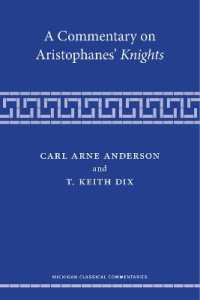- ホーム
- > 洋書
- > ドイツ書
- > Humanities, Arts & Music
- > Philosophy
Full Description
This book presents a historico-logical study of vitalism. It begins by uncovering previously unknown doctrines of vitalism from the history of science—encompassing biological, physical, and social sciences—and then subjects these doctrines to a thorough logical analysis. Through this process, the book offers a unified conceptual framework to understand the major doctrines of vitalism in the history of science, ultimately relating vitalism to the question of life. Following the classical methodological approach endorsed by Immanuel Kant, nineteenth-century philosopher-scientists like Ernst Mach, and early-twentieth-century logical analysts, including logical empiricists, British analysts, pragmatists, Husserlian phenomenologists, and neo-Kantians, this work provides unconventional and valuable perspectives on vitalism and the riddle of life, appealing to a broad audience, including scientists, historians, and philosophers of science, particularly those from biological backgrounds.
Contents
Chapter 1. Introduction: vitalism and the idea of a historico-logical study.- Chapter 2. Reconsider Hans Driesch's vitalism: new perspectives.- Chapter 3.- Vitalism and evolution.- Chapter 4. Vitalism and mind.- Chapter 5. Vitalism, heat, gravity, electricity, magnetism, and motion.- Chapter 6. Vitalism and chemistry.- Chapter 7. Vitalism and energy physics.- Chapter 8. Vitalism, thermodynamics, and statistical mechanics.- Chapter 9. Vitalism and quantum mechanics.- Chapter 10. Chronic vitalism: Lessons from the history of science.- Chapter 11. A critique of current philosophy of biology.- Chapter 12. Conclusion: On the riddle of life.
-

- 電子書籍
- バーバリアンクエスト【タテヨミ】第43…
-

- 電子書籍
- 元尊~龍の飛翔~【タテヨミ】第136話…
-

- 電子書籍
- 塔子さんはいい大人じゃいられない【単話…
-

- 電子書籍
- リアデイルの大地にて【分冊版】 2 電…




